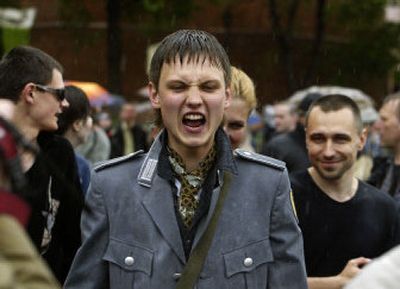Moscow riot police break up city’s first gay pride parade

MOSCOW – Riot police broke up an attempt by gays and lesbians in Moscow to stage the city’s first gay pride parade Saturday, and gay activists who attempted to lay flowers near the Tomb of the Unknown Soldier outside the Kremlin wall and then assemble across from city hall were heckled and assaulted by skinheads, Orthodox Christians and radical nationalists.
Police said they had arrested about 120 people, both supporters and opponents of the parade. Gay activists were dragged away by riot police when they began speaking to reporters, but opponents of the parade, including a nationalist member of parliament, were allowed to speak and chant, “Moscow is not Sodom.”
Several international activists and politicians traveled to Moscow in a show of support for Moscow’s gays and lesbians. Volker Beck, a German member of Parliament for the Green Party, marched with the group and was struck in the face by a skinheads outside city hall. He was briefly detained after the incident. A Canadian journalist was also assaulted by opponents of the parade who threw smoke bombs and eggs before police moved in to disperse them.
“Lesbians and gays have to cope with major problems in Russia,” Beck said at a news conference earlier in the day. “There is a massive threat of violence, and it is also frightening that there is no clear support from the state for the rights of lesbian and gay citizens. On the contrary, the mayor of Moscow deprives people who advocate tolerance and equal rights of the freedom to demonstrate.”
The city had banned the parade on the grounds that it was anathema to the values of most people in the city and therefore presented a threat of sparking violence. A city court upheld the ban Friday.
Mayor Yuri Luzhkov said in a radio interview Friday that gay parades “may be acceptable for some kind of progressive, in some sense, countries in the West, but it is absolutely unacceptable for Moscow, for Russia.”
“As long as I am mayor, we will not permit these parades to be conducted,” he said.
Homosexuality was decriminalized in Russia in 1993, but the gay community in Moscow remains largely underground. Some gay activists had objected to the parade, which was the culmination of a Gay Pride festival, saying it was likely to provoke a backlash that could damage efforts to build tolerance.
Other activists, backed by international supporters from the United States and Western Europe, decided to go ahead with the demonstration. Unable to march legally, they decided to place flowers at the Tomb of the Unknown Soldier on Saturday afternoon but to act as individual citizens to avoid being charged with staging an illegal protest.
A phalanx of riot police sealed off Alexander’s Garden where the tomb is located, and women singing hymns and skinheads jostled with the several dozen gay activists when they arrived.
Nikolai Alexeyev, a leading gay rights activist, was arrested at the monument. “This is a great victory, an absolute victory – look at what’s happening,” he shouted as he was taken away.
A small group of activists, followed by an even larger crowd of reporters, then made their way to a square across from city hall where their opponents had already assembled.
“We are going to clean ourselves of the dirt of the last 15 years,” said Nikolai Kuryanovic, a member of parliament for the nationalist Liberal Democratic Party of Russia, speaking at the foot of a monument to Yury Dolgoruky, the founder of Moscow. “This provocation failed.”
Riot police looked on as Kuryanovic spoke, but moved in as soon as Yevgenia Debryanskaya, a leading lesbian activist, began to speak to reporters. She was dragged away.
Police also stood by as skinheads crowded around Beck and Scott Long of the U.S.-based Human Rights Watch, who had unfurled a rainbow flag.
“The police were encouraging the skinheads,” Long said. “It was disturbing but not surprising. Luzhkov spent months encouraging violence by his public homophobia.”